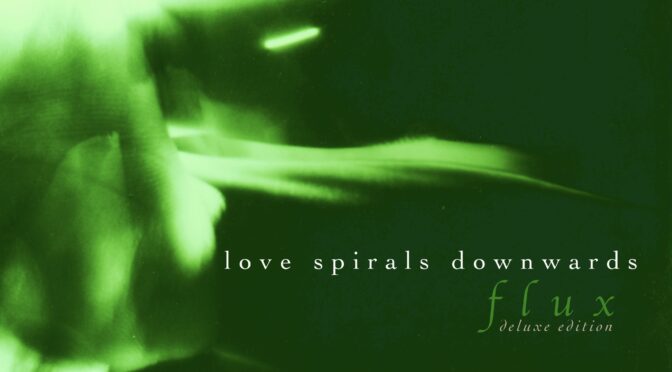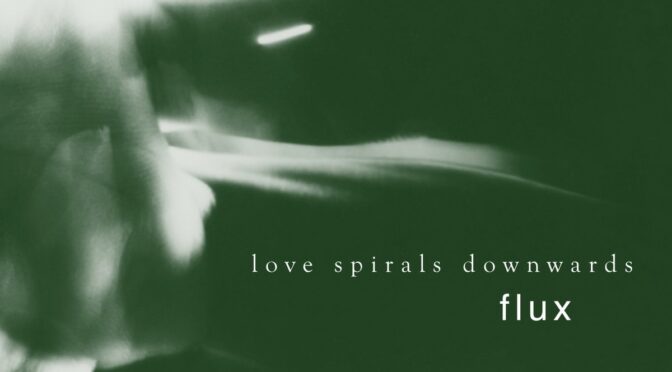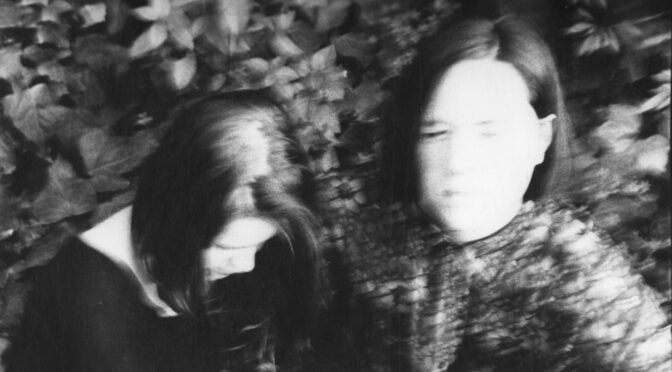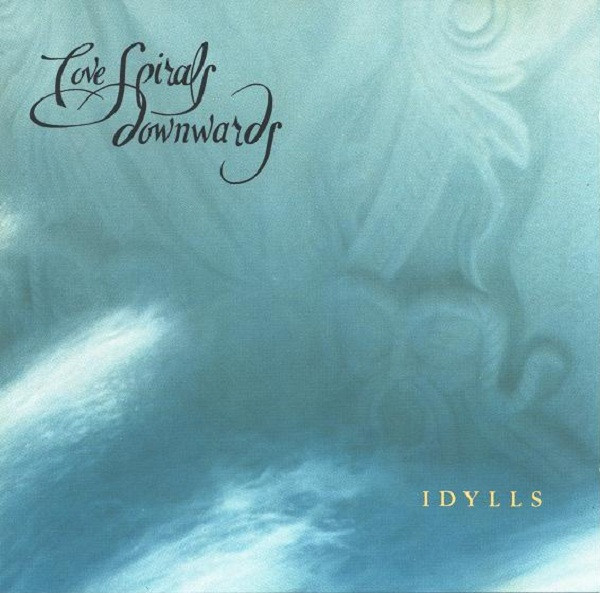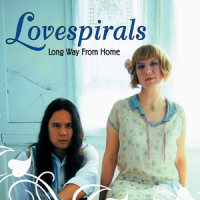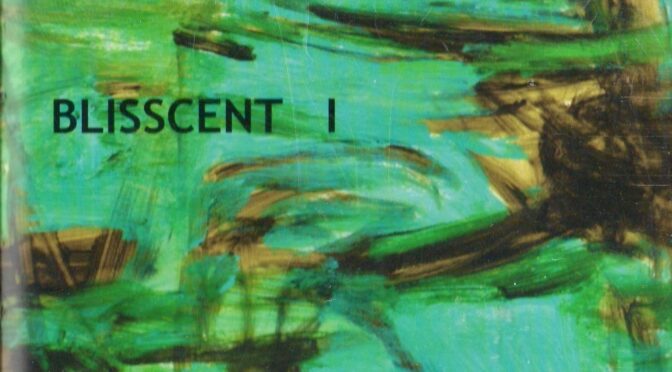Japanese blog, Drowning in Melancholy aka DIM, reviewed ‘Aitu’ by Melodyguild — the early 2000’s band of Suzanne Perry. This mini-feature gives a brief overview of the band’s origin as it compares the sound of this album vs Love Spirals Downwards’ work. Here is a partial transcription care of Google Translate.
Continue reading DIM Reviews “Aitu” by MelodyguildCategory Archives: Review
Opus Zine Reviews ‘Flux Deluxe’ Digital LP
Jason Moore wrote a mostly positive review of the original Projekt Records release ‘Flux,’ back in 2000 (“Love Spirals Downwards have released an album that’s incredibly listenable and quite beautiful”), and now he’s back to cover the new ‘Deluxe Edition’ two plus decades later:
Lum has remastered and reissued Flux along with a number of bonus tracks, including outtakes, remixes, and live performances. Which is a perfect way to discover one of my favorite Projekt releases, an album that I often turn to when I need to chill out and bliss out at the same time.
—Opus Zine
Check out the full Opus Zine review of Love Spirals Downwards ‘Flux (Deluxe Edition).’
Preview of Lovespirals’ New Album on MusicTap
MusicTap made a little write up about our very soon to be released album, Life Goes On.
Since 1992, the genesis of the current Lovespirals began a recording career as Love Spirals Downwards (Ryan Lum and Suzanne Perry) with four exquisite recordings (Idylls – 1992, Ardor – 1994, Ever – 1996, Flux – 1998), all on Projekt Records. After a short hiatus, the band regathered with a new vocalist by the name of Anji Bee, and released four additional excellent sets (Windblown Kiss – 2002, Free & Easy – 2005, Long Way From Home – 2007, Future Past – 2010) as Lovespirals. After a long, long break from recording as a duo (Anji Bee released a solo album, Love Me Leave Me, back in 2013), the Lovespirals iteration will deliver their fifth album, Life Goes On, with a collection of ten new songs written by the pair. Having been a fan from the beginning, I’m excited for this new collection of music from Ryan and Anji.
— Matt Rowe
Head over to MusicTap to read the full article.
Gothic Beauty Reviews Future Past
To our great surprise, Gothic Beauty included a review of Lovespirals’ 2010 album, Future Past, in the latest issue of their 80 page glossy color magazine. Gothic Beauty Issue 33 is available now at Barnes & Noble, Borders, Hastings, Chapters, Walden Books, Book World, Sheltam Books and Copperfield’s Books – or directly via gothicbeauty.com. Reviewer Michael writes, in part:
“This album is designed for chill atmospheres. It reminds me of late nights at the bar and a jukebox loaded with good music. The song “Rain” is not to be missed — I’ve fallen in love with the song and want to have the song’s babies.”
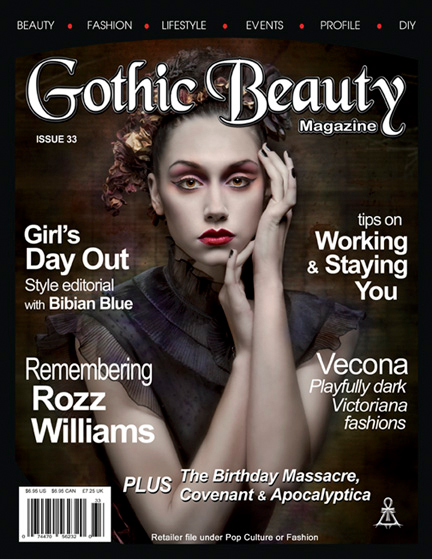
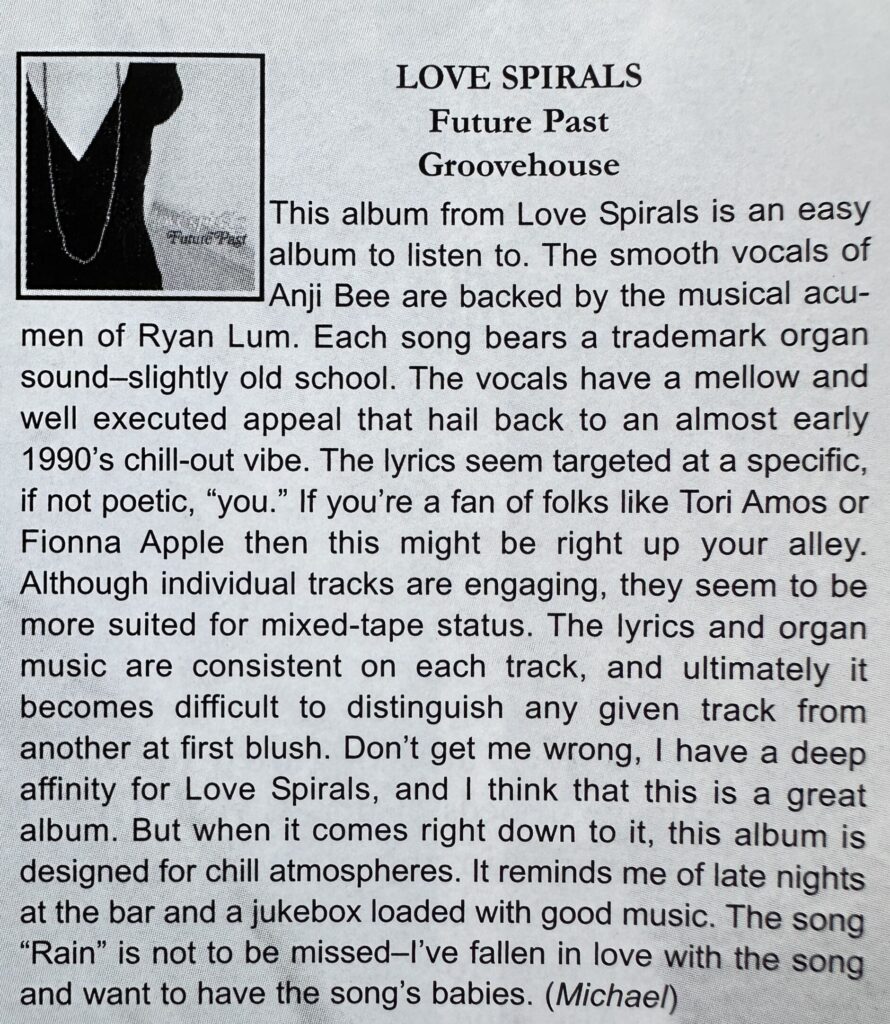
Re:Gen Mag Reviews Future Past
Re:Gen online magazine review of the latest Lovespirals album:
Ryan Lum and Anji Bee go big on their fourth full-length album, adding ‘70s blues and progressive rock elements to their chilled out soul-tinged electronica.
Their fourth album together is a step into a bigger sound for Ryan Lum and Anji Bee. The duo’s fascination for ‘70s soul and jazz is amplified in Lum’s production, with the Rhodes piano that gave 2007’s Long Way from Home so much of its signature warmth joined by lush, almost disco-tinged strings on the languid, smokey “Rain” and the laidback but funky “Water Under the Bridge.” The guitars are bigger too, the spaced out progressive instrumental “Meanwhile, Irreplaceable Time Flees” segueing into the wah-wah-laced soul of “Insignificant.” Bee’s voice is stronger, more mature, and more powerful this time around as well; Lum and Bee have a reputation for love songs, but “Feel So Good” and “Shine” are positively lusty, highlighting both Bee’s range and her sensuality. The real standout on this album, though, is “Home,” which is more reminiscent of earlier Lovespirals songs in its cozy romantic vibe but features the best singing the pair have ever recorded, with subtle multi-tracking enhancing an already impressive vocal showing.
Continue reading Re:Gen Mag Reviews Future Past
Hypnagogics Review of ‘Flux’
A retrospective look back at Love Spirals Downwards album, ‘Flux,’ appeared on the Hypnagogics blog. Unfortunately it includes an illegal download of the album, as well, when they could have simply added links to legal streaming files, but since they aren’t respecting our content rights, it seems fair for us to share theirs, in turn.
‘Flux’ Review by Autech
For a couple of years in the mid to late 90’s any movie trailer that you saw that had any sense of futuristic action featured a generic breakbeat track typically over some throaty unintelligible female vocals. For some reason, the drum and bass breakbeat became shorthand for futuristic action movies. Some of these films actually featured full soundtracks in the same vein, like The Matrix movies. The funny thing about all of this is D&B didn’t become the music of the future, and pretty much all of it sounds incredibly dated. Even current artists who produce within the genre have a hard time breaking out of the box that they got put in in the 80’s.
What does this have to do with anything? Well Flux, the third album by Love Spirals Downwards, prominently features the breakbeat, but in an interesting and effective way. Their previous two albums were a mix of ethereal female vocals mixed with shoegazey guitars, and are good in their own right. But on flux they dropped the standard percussion of those albums in favor of a more electronic approach. The mix is a lot more appealing than it sounds on paper, in that it gives us a unique take on both shoegaze as well as downbeat electronica and trip-hop.
The album actually starts off somewhat weakly, with the fairly forgettable yet pleasant “City Moon”, which is followed by a much more interesting track “Alicia”. The song is an interesting mix of Spanish sounding guitars and vocals over the breakbeat that will become standard for nearly the rest of the album. One thing that is interesting is how close they come to sounding too New Agey on the album, yet they never cross the line into schmaltziness.
There are three vocal based tracks that really stick out to me on Flux. The first is “Psyche”, which has all the elements of Flux that makes it such a good album. There is less delay on the vocals, which make the lyrics more intelligible and affecting, and the droning loop underneath provides a good base for the rest of the track to build on. There are actually only a few elements at work on the track, but they come together with such ease that they sound as one.
Next would be the similar “By Your Side”. It sounds like a b-side to “Psyche” in that it evokes much of the same emotions and has many of the same elements. The vocals on the track sound somewhat flat, but that just makes it that much more endearing,especially considering the studio wizardry that would make them sound completely impersonal if they were to be recorded today.
Last is “Ring”, which takes its time a bit more than the other two tracks mentioned. Listened to one after another, this one is definitely comes off sounding more sincere. I don’t know if its the vocal performance or the more up front backing track, but whatever it is makes this the track to listen to if you were only to listen to one track off of Flux.
However its not all breakbeats on Flux, as exampled on “Sunset Bell”. Starting off sounding like a lullaby, it twists and morphs into a loopy psyched out bliss track, in the vein of the first two Seefeel records. At 8 minutes it is the longest track of the album, but no time is wasted. The build covers the running time well, and it never comes off as sounding bored or tired.
Flux is an interesting piece of crossover music history. It is strange to me that this blend of genre’s exhibited wasn’t emulated by other musicians, but maybe thats what makes this album so memorable.
Opus Zine Reviews Idylls
Jason Moore has posted a review of the original 1992 Projekt Records release of Idylls to his Opus Zine. The following is just an excerpt. Read the full review on the zine’s website.
Let’s get the obvious out of way: the Cocteau Twins are Idylls’ most obvious point of reference, particularly Treasure and Victorialand. Ryan Lum’s guitars create the same sort of jawdroppingly gorgeous soundscapes as those produced by Robin Guthrie, Suzanne Perry’s gorgeous voice echoes Elizabeth Fraser’s gossamery glossolalia, and beneath it all, there’s the cold, artificial thump of a drum machine (which serves only to highlight the music’s ethereal aspects).
Perry’s voice proves surprisingly versatile, moving from Fraser’s angelic cooing to an almost Middle-Eastern tone (“Scatter January”, “Forgo”) that gives the music its own special feeling of exotica to a state of complete bliss-out in which she’s more than content to drift along to wherever Lum’s guitarwork might lead (“Love’s Labour’s Lost”, “Noumena Of Spirit”).
As for Lum, well, he may be certainly indebted to Guthrie, but he’s certainly no sycophant. The acoustic-based “Love Labour’s Lost” could almost pass for a Lothlórien folk standard and both “Eudaimonia” and “Waiting For The Sunrise” are explorations in guitar ambience, especially the latter, which eschews any sort of percussion or any similar “earthly” element for a golden sound that’s truly fitting given its title.
Meanwhile, “Dead Language” and “Stir Among The Stars” are darker, harsher tracks that fall firmly under the “darkwave” umbrella championed by Projekt. “Dead Language” in particular is a chilly, goth-y delight; Lum’s guitars grow increasingly brittle and frantic, eventually exploding into icy shards that ricochet off the drum machine and threaten to impale Perry’s fragile banshee.
Opus Zine Reviews Long Way From Home
Jason Moore reviewed Lovespirals’ latest album, Long Way From Home, for his Opus Zine. You can read the full review on his website.
It doesn’t feel quite right to say that Lovespirals is merely the new incarnation of Love Spirals Downwards, even though it’s pretty obvious why folks (myself included) would say that — and not just because of the name similarities. While founder/songwriter Ryan Lum has largely eschewed the gothic/darkwave overtones of his previous band, there’s still no denying that the ghosts of acts such as the Cocteau Twins still haunt their way through Lovespirals’ Long Way From Home. One need only to listen to hazy guitar strums or shimmery effects on “Empty Universe,” “Treading The Water,” or “Sundrenched” for that to become readily apparent.
And then there’s Anji Bee’s vocals. Bee lets her voice drift and sway through the album’s ten tracks in a manner recalling Love Spirals Downwards’ previous vocalists (such as Suzanne Perry), Liz Frazier (minus the glossolalia), and even Tracey Thorn (Everything But The Girl). You know what I’m talking about: a manner that is seductive, not so much for its sultriness and smokiness, but for its ethereal and otherworldly nature.
All that being said, however, Long Way From Home is far more straightforward than anything Lum (and his various collaborators) has done to date — especially when compared to the Projekt days. While there are certainly echoes of those early darkwave records, replete with their Victorialand influences, Long Way From Home also blends in more forthright pop, jazz, Americana, and even blues for good measure. The duo pull the music off effortlessly, with Lum’s lush production and guitar effects providing a gorgeous, sunlit backdrop for Bee’s vocals.
Ultimately, Lum and Bee are all about creating a mood with their music, a relaxed and blissed-out vibe that should be no stranger to fans of dreampop, chill-out electronica, and atmospheric pop. This is music for both late night sessions and noon daydreams, for both listening to at work when you need to escape the pressure of the day and at home when you simply need to unwind with a good book and a glass of wine. From that perspective, Long Way From Home succeeds pretty well.
Re:Gen Magazine Reviews Long Way From Home
By Matthew Johnson
On their third album, Lovespirals shift away from overt electronica in favor of beautiful, understated folk and blues ballads.
If sophomore album Free and Easy saw Lovespirals’ sound at its biggest, Long Way from Home is the duo’s most intimate, forsaking house beats and jazz flourishes for understated slide guitar and acoustic strums. Ryan Lum’s production is more mature than ever before; unless you really listen for it, you won’t be able to tell that he plays and records all the instruments himself – maybe not even then – and the drums sound warm and clear, betraying no hint of sampler or sequencer. Instead, Lum lets his arrangements take center stage, with emotive guitar solos harmonizing with electric organ on the bluesy ballad “Once in a Blue Moon” and relaxed acoustic strums highlighting jazzy piano chords on “Nocturnal Daze.” Anji Bee’s vocals are beautifully languid, the sweetness swathed in melancholy on the plaintive “Caught in the Groove,” adorned by floating background harmonies on “Treading the Water,” and sensual yet dreary on the pair’s stark rendition of classic spiritual “Motherless Child.” Fans of the pair’s more overtly romantic material will appreciate unabashed love song “This Truth,” and there’s even a hint of the ethereal dreaminess of Lum’s previous project, Love Spirals Downwards, on the fuzzy overlapping guitar tones and meandering vocals of “Sundrenched” and “Lazy Love Days.”
It’s not an understatement to call Long Way from Home the duo’s most accomplished work up to date; as enjoyable as their previous explorations of laidback electronica and jazz fusion have been, this album captures Lum and Bee’s warm musical chemistry in a way that previous releases only hinted at.
View the original review at Re:Gen Magazine.
Opus Zine Reviews Blisscent 1 CD
Opus Zine has reviewed the Blisscent 1 compilation CD on their website. I was just going to post the bit about Lovespirals’ track, “He Calls Me,” however it only make sense in the context of the commentary preceding:
Alcian Blue’s track just feels a bit clumsy. The recording quality feels lacking, resulting in the whole song sounding rather flat. Unlike Skywave, where the lo-fi recording actually adds to the over noise assault, here it just makes what might otherwise be a decent song rather plodding.
However, there are no such complaints with Lovespirals’ “He Calls Me.” Formerly know as Love Spirals Downwards, Lovespirals features a new vocalist and a slightly different direction. Gone are drum and bliss textures of Flux, instead hinting back the group’s earlier releases, such as Ardor. Spanish-tinged acoustic guitar work and light drums provide the perfect setting for Anji’s beautiful vocals. Even more interestingly, the lyrics point at the song’s more spiritual origins: “His voice is like a song/I hear the melodies/So I learn them, write them down/So I can play them/Let them understand you are in everything we do/Show them your glory.”
— Jason Moore, Opus Zine



